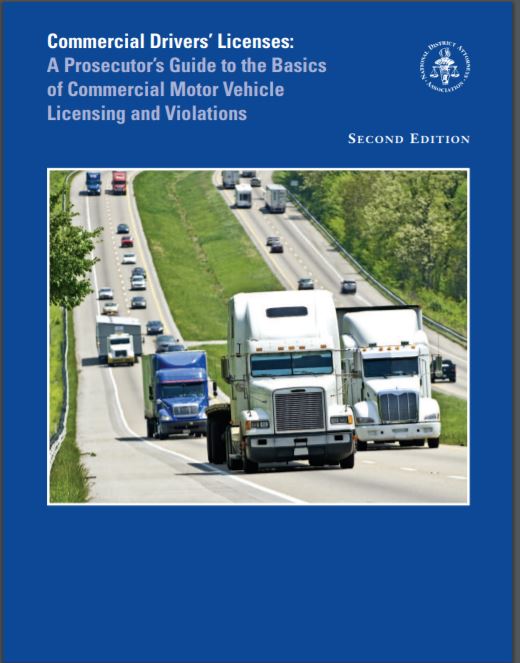
The
CDL Monograph: A Prosecutor’s Guide to the Basics of Commercial Motor Vehicle Licensing and Violations provides a comprehensive overview of federal and state regulations governing commercial driver’s licenses (CDLs) and commercial motor vehicles (CMVs). It covers licensing requirements, medical and drug testing standards, vehicle classifications, and enforcement procedures, emphasizing the importance of accurate conviction reporting and the prohibition of “masking” violations. The guide also outlines prosecutorial strategies for handling CMV-related crashes, including evidence collection, driver and carrier responsibilities, and legal considerations for disqualification and criminal charges.
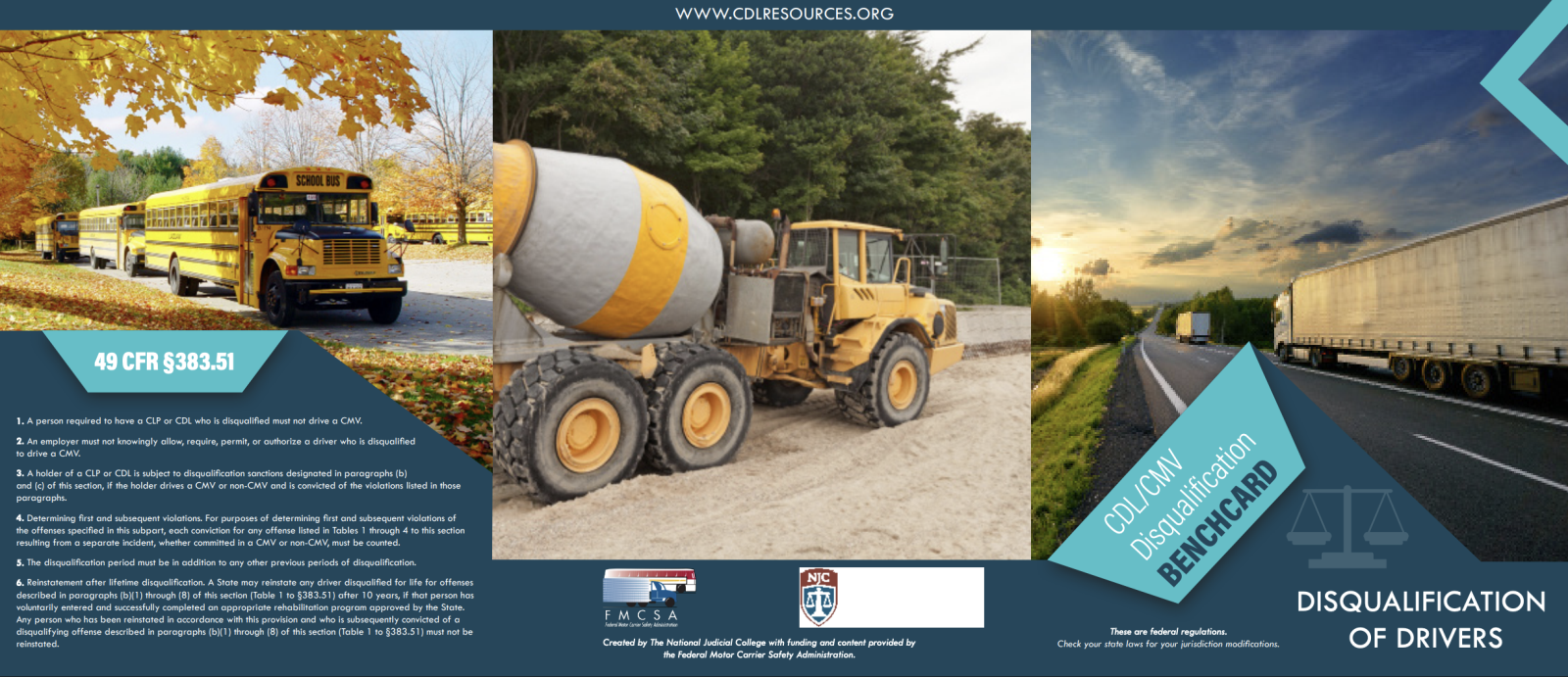
The
NJC CDL Disqualification Benchcard summarizes federal regulations under 49 CFR §383.51 regarding disqualifications for commercial drivers based on specific offenses. It outlines mandatory disqualification periods for violations such as DUI, drug offenses, reckless driving, and railroad crossing infractions, emphasizing that both CMV and non-CMV convictions can impact a CDL holder’s eligibility to operate a commercial vehicleCDL Quick Reference Guide
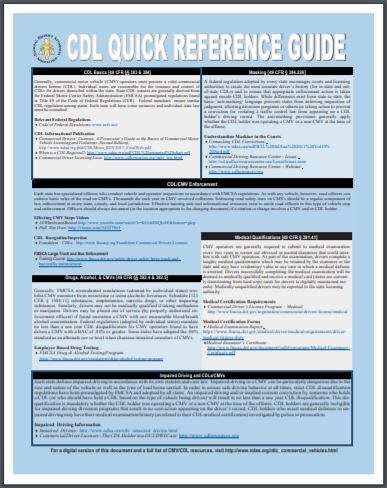
The
CDL Quick Reference Guide provides an overview of federal and state regulations governing commercial driver’s licenses (CDLs) and commercial motor vehicles (CMVs). It covers key topics such as licensing requirements, anti-masking rules, medical qualifications, drug and alcohol testing, impaired and distracted driving enforcement, hazardous materials transport, crash investigations, and criminal activity involving CMVs. The guide also includes links to training resources, legal references, and enforcement tools to assist law enforcement, prosecutors, and other stakeholders in ensuring roadway safety and regulatory compliance.
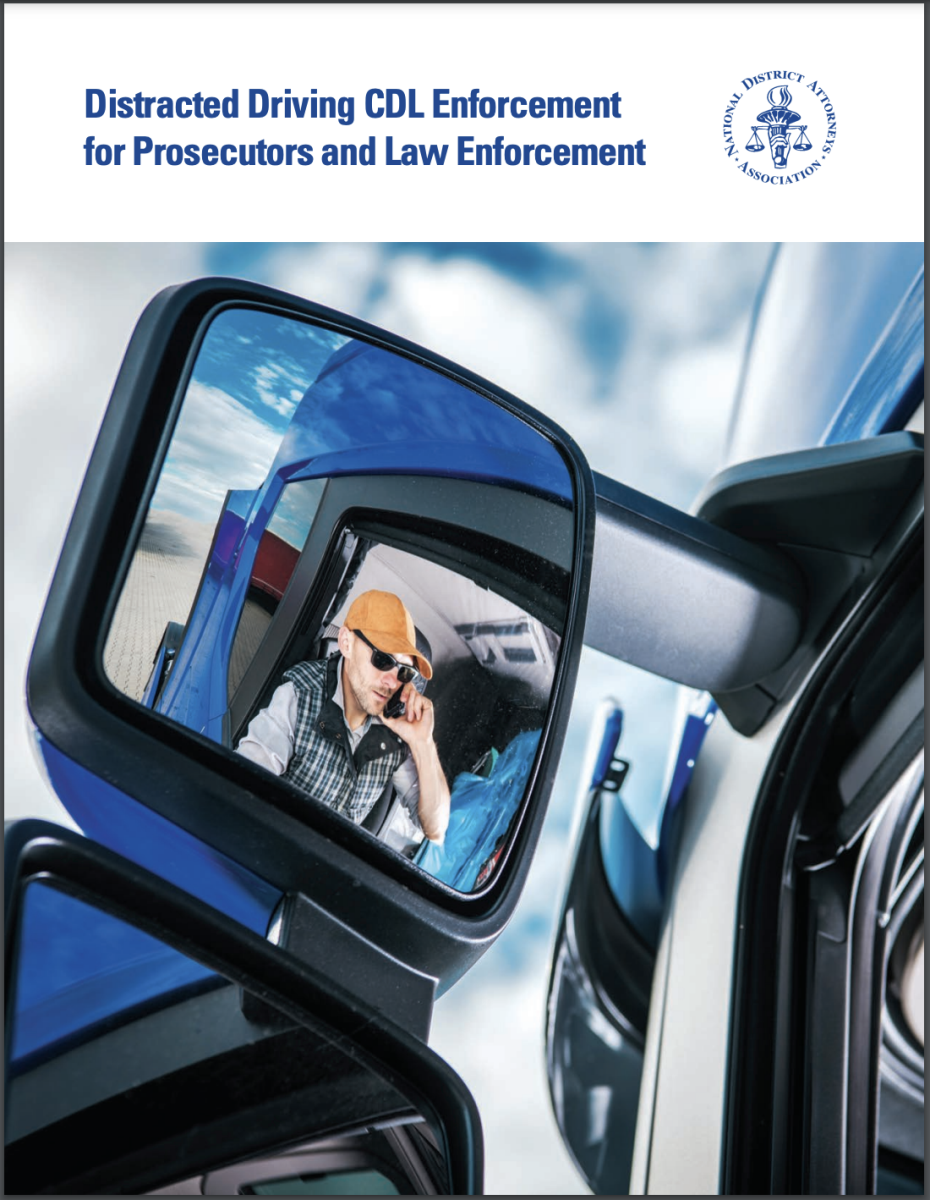
The
Distracted Driving CDL Enforcement for Prosecutors and Law Enforcement guide provides a comprehensive overview of how distracted driving impacts commercial motor vehicle (CMV) operators and outlines strategies for enforcement and prosecution. It emphasizes the heightened risks posed by distracted CDL holders due to the size and weight of CMVs, and details investigative techniques, legal standards, and evidentiary considerations for both non-fatal and fatal crashes. The guide also highlights the importance of expert testimony, proper documentation, and victim communication to ensure accountability and justice in distracted driving cases involving commercial drivers.
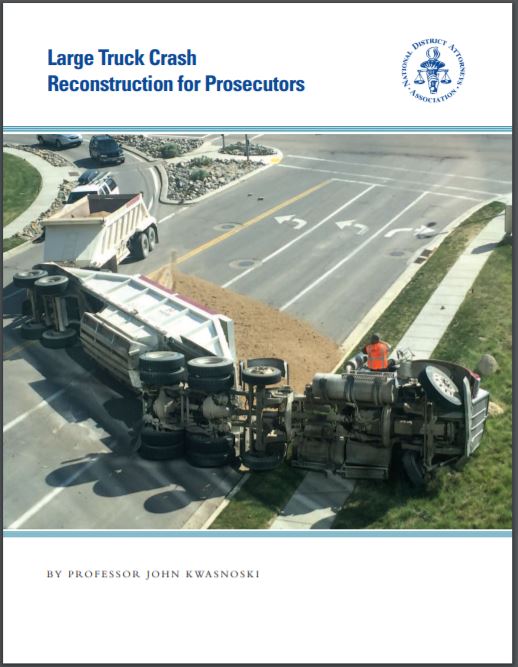
The
Large Truck Crash Reconstruction for Prosecutors guide provides a comprehensive overview of the unique dynamics and investigative considerations involved in commercial motor vehicle (CMV) crashes. It explains how CMV collisions differ from car crashes due to factors like vehicle weight, braking systems, driver visibility, and electronic data recording. The guide equips prosecutors with technical knowledge and reconstruction methodologies to assess driver culpability, interpret crash evidence, and understand federal regulations affecting commercial drivers.
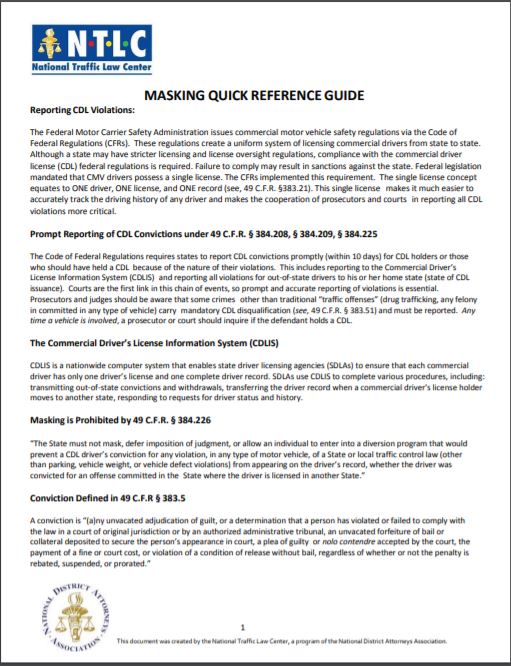
The
Masking Quick Reference Guide explains the federal prohibition against "masking" convictions for commercial driver's license (CDL) holders, which includes deferring, diverting, or amending traffic violations to avoid proper reporting. It outlines specific examples of prosecutorial and judicial actions that constitute masking, emphasizing that all CDL-related convictions must be accurately reported to maintain safety and compliance with federal regulations. The guide serves as a resource for prosecutors and courts to ensure transparency and accountability in CDL violation handling.
 The CDL Monograph: A Prosecutor’s Guide to the Basics of Commercial Motor Vehicle Licensing and Violations provides a comprehensive overview of federal and state regulations governing commercial driver’s licenses (CDLs) and commercial motor vehicles (CMVs). It covers licensing requirements, medical and drug testing standards, vehicle classifications, and enforcement procedures, emphasizing the importance of accurate conviction reporting and the prohibition of “masking” violations. The guide also outlines prosecutorial strategies for handling CMV-related crashes, including evidence collection, driver and carrier responsibilities, and legal considerations for disqualification and criminal charges.
The CDL Monograph: A Prosecutor’s Guide to the Basics of Commercial Motor Vehicle Licensing and Violations provides a comprehensive overview of federal and state regulations governing commercial driver’s licenses (CDLs) and commercial motor vehicles (CMVs). It covers licensing requirements, medical and drug testing standards, vehicle classifications, and enforcement procedures, emphasizing the importance of accurate conviction reporting and the prohibition of “masking” violations. The guide also outlines prosecutorial strategies for handling CMV-related crashes, including evidence collection, driver and carrier responsibilities, and legal considerations for disqualification and criminal charges. The NJC CDL Disqualification Benchcard summarizes federal regulations under 49 CFR §383.51 regarding disqualifications for commercial drivers based on specific offenses. It outlines mandatory disqualification periods for violations such as DUI, drug offenses, reckless driving, and railroad crossing infractions, emphasizing that both CMV and non-CMV convictions can impact a CDL holder’s eligibility to operate a commercial vehicleCDL Quick Reference Guide
The NJC CDL Disqualification Benchcard summarizes federal regulations under 49 CFR §383.51 regarding disqualifications for commercial drivers based on specific offenses. It outlines mandatory disqualification periods for violations such as DUI, drug offenses, reckless driving, and railroad crossing infractions, emphasizing that both CMV and non-CMV convictions can impact a CDL holder’s eligibility to operate a commercial vehicleCDL Quick Reference Guide The CDL Quick Reference Guide provides an overview of federal and state regulations governing commercial driver’s licenses (CDLs) and commercial motor vehicles (CMVs). It covers key topics such as licensing requirements, anti-masking rules, medical qualifications, drug and alcohol testing, impaired and distracted driving enforcement, hazardous materials transport, crash investigations, and criminal activity involving CMVs. The guide also includes links to training resources, legal references, and enforcement tools to assist law enforcement, prosecutors, and other stakeholders in ensuring roadway safety and regulatory compliance.
The CDL Quick Reference Guide provides an overview of federal and state regulations governing commercial driver’s licenses (CDLs) and commercial motor vehicles (CMVs). It covers key topics such as licensing requirements, anti-masking rules, medical qualifications, drug and alcohol testing, impaired and distracted driving enforcement, hazardous materials transport, crash investigations, and criminal activity involving CMVs. The guide also includes links to training resources, legal references, and enforcement tools to assist law enforcement, prosecutors, and other stakeholders in ensuring roadway safety and regulatory compliance. The Distracted Driving CDL Enforcement for Prosecutors and Law Enforcement guide provides a comprehensive overview of how distracted driving impacts commercial motor vehicle (CMV) operators and outlines strategies for enforcement and prosecution. It emphasizes the heightened risks posed by distracted CDL holders due to the size and weight of CMVs, and details investigative techniques, legal standards, and evidentiary considerations for both non-fatal and fatal crashes. The guide also highlights the importance of expert testimony, proper documentation, and victim communication to ensure accountability and justice in distracted driving cases involving commercial drivers.
The Distracted Driving CDL Enforcement for Prosecutors and Law Enforcement guide provides a comprehensive overview of how distracted driving impacts commercial motor vehicle (CMV) operators and outlines strategies for enforcement and prosecution. It emphasizes the heightened risks posed by distracted CDL holders due to the size and weight of CMVs, and details investigative techniques, legal standards, and evidentiary considerations for both non-fatal and fatal crashes. The guide also highlights the importance of expert testimony, proper documentation, and victim communication to ensure accountability and justice in distracted driving cases involving commercial drivers. The Large Truck Crash Reconstruction for Prosecutors guide provides a comprehensive overview of the unique dynamics and investigative considerations involved in commercial motor vehicle (CMV) crashes. It explains how CMV collisions differ from car crashes due to factors like vehicle weight, braking systems, driver visibility, and electronic data recording. The guide equips prosecutors with technical knowledge and reconstruction methodologies to assess driver culpability, interpret crash evidence, and understand federal regulations affecting commercial drivers.
The Large Truck Crash Reconstruction for Prosecutors guide provides a comprehensive overview of the unique dynamics and investigative considerations involved in commercial motor vehicle (CMV) crashes. It explains how CMV collisions differ from car crashes due to factors like vehicle weight, braking systems, driver visibility, and electronic data recording. The guide equips prosecutors with technical knowledge and reconstruction methodologies to assess driver culpability, interpret crash evidence, and understand federal regulations affecting commercial drivers. The Masking Quick Reference Guide explains the federal prohibition against "masking" convictions for commercial driver's license (CDL) holders, which includes deferring, diverting, or amending traffic violations to avoid proper reporting. It outlines specific examples of prosecutorial and judicial actions that constitute masking, emphasizing that all CDL-related convictions must be accurately reported to maintain safety and compliance with federal regulations. The guide serves as a resource for prosecutors and courts to ensure transparency and accountability in CDL violation handling.
The Masking Quick Reference Guide explains the federal prohibition against "masking" convictions for commercial driver's license (CDL) holders, which includes deferring, diverting, or amending traffic violations to avoid proper reporting. It outlines specific examples of prosecutorial and judicial actions that constitute masking, emphasizing that all CDL-related convictions must be accurately reported to maintain safety and compliance with federal regulations. The guide serves as a resource for prosecutors and courts to ensure transparency and accountability in CDL violation handling.
